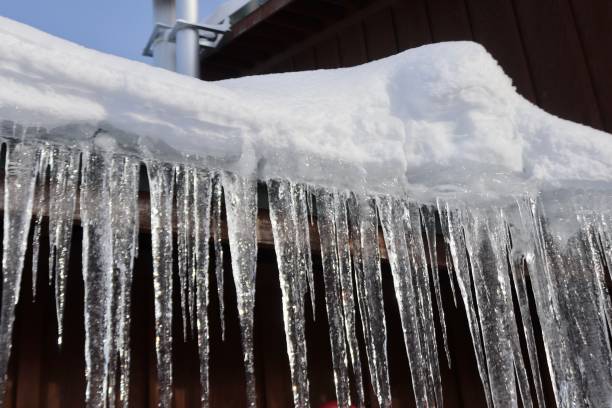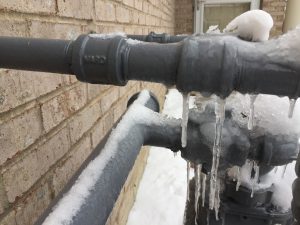How to Avoid Frozen Plumbing in Cold Weather: Expert Guidance
How to Avoid Frozen Plumbing in Cold Weather: Expert Guidance
Blog Article
Presented here down the page you will find a lot of good insight with regards to 6 Ways to Prevent Frozen Pipes.

Cold weather can ruin your plumbing, especially by freezing pipelines. Below's just how to prevent it from happening and what to do if it does.
Intro
As temperature levels decrease, the danger of frozen pipes boosts, potentially resulting in pricey repairs and water damages. Comprehending exactly how to stop icy pipelines is important for home owners in cool environments.
Comprehending Frozen Pipelines
What triggers pipelines to ice up?
Pipes ice up when subjected to temperatures below 32 ° F (0 ° C) for expanded durations. As water inside the pipelines ices up, it increases, taxing the pipe walls and possibly triggering them to rupture.
Risks and problems
Frozen pipes can lead to water interruptions, building damage, and costly fixings. Burst pipes can flooding homes and create comprehensive architectural damage.
Indicators of Frozen Pipes
Identifying icy pipelines early can avoid them from breaking.
How to recognize frozen pipelines
Look for reduced water circulation from taps, uncommon odors or noises from pipes, and visible frost on exposed pipes.
Avoidance Tips
Shielding at risk pipelines
Wrap pipes in insulation sleeves or make use of warmth tape to safeguard them from freezing temperatures. Focus on pipelines in unheated or external areas of the home.
Heating strategies
Keep interior rooms appropriately heated up, specifically locations with plumbing. Open cabinet doors to allow cozy air to flow around pipes under sinks.
Securing Outdoor Pipes
Garden hose pipes and outdoor taps
Disconnect and drain yard tubes prior to wintertime. Set up frost-proof spigots or cover outside taps with shielded caps.
What to Do If Your Pipelines Freeze
Immediate activities to take
If you presume frozen pipes, maintain taps open up to eliminate pressure as the ice thaws. Use a hairdryer or towels taken in hot water to thaw pipelines slowly.
Long-Term Solutions
Structural changes
Consider rerouting pipes away from outside walls or unheated areas. Add additional insulation to attic rooms, cellars, and crawl spaces.
Updating insulation
Purchase premium insulation for pipes, attics, and walls. Proper insulation aids maintain constant temperature levels and lowers the threat of icy pipelines.
Final thought
Stopping frozen pipelines needs proactive steps and fast feedbacks. By recognizing the reasons, indicators, and preventive measures, homeowners can shield their plumbing during cold weather.
Helpful Tips to Prevent Frozen Pipes this Winter
UNDERSTANDING THE BASICS: WHY PIPES FREEZE AND WHY IT’S A PROBLEM
Water freezing inside pipes is common during the winter months, but understanding why pipes freeze, and the potential problems it can cause is crucial in preventing such incidents. This section will delve into the basics of why pipes freeze and the associated problems that may arise.
THE SCIENCE BEHIND FROZEN PIPES
When water reaches freezing temperatures, it undergoes a physical transformation and solidifies into ice. This expansion of water as it freezes is the primary reason pipes can burst. As the water inside the pipe freezes, it expands, creating immense pressure on the walls. If the pressure becomes too great, the pipe can crack or rupture, leading to leaks and water damage.
FACTORS THAT CONTRIBUTE TO PIPE FREEZING
Low Temperatures: Extremely cold weather, especially below freezing, increases the risk of pipes freezing. Uninsulated or Poorly Insulated Pipes: Pipes located in unheated areas, such as basements, crawl spaces, or attics, are more prone to freezing. Insufficient insulation or lack of insulation altogether exacerbates the problem. Exterior Wall Exposure: Pipes running along exterior walls are susceptible to freezing as they encounter colder temperatures outside. Lack of Heating or Temperature Regulation: Inadequate heating or inconsistent temperature control in your home can contribute to frozen pipes. PROBLEMS CAUSED BY FROZEN PIPES
- Pipe Bursting: As mentioned earlier, the expansion of water as it freezes can cause pipes to burst, resulting in significant water damage.
- Water Damage: When pipes burst, it can lead to flooding and water damage to your property, including walls, ceilings, flooring, and personal belongings.
- Structural Damage: Prolonged exposure to water from burst pipes can compromise the structural integrity of your home, leading to costly repairs.
- Mold and Mildew Growth: Excess moisture from water damage can create a favorable environment for mold and mildew growth, posing health risks to occupants.
- Disrupted Water Supply: Frozen pipes can also result in a complete or partial loss of water supply until the issue is resolved.
WHY CERTAIN PIPES ARE MORE PRONE TO FREEZING
- Location: Pipes located in unheated or poorly insulated areas, such as basements, crawl spaces, attics, or exterior walls, are at higher risk of freezing.
- Exterior Pipes: Outdoor pipes, such as those used for irrigation or exposed plumbing, are particularly vulnerable to freezing as they are directly exposed to the elements.
- Supply Lines: Pipes that carry water from the main water supply into your home, including the main water line, are critical to protect as freezing in these lines can affect your entire plumbing system.
- Underground Pipes: Pipes buried underground, such as those connected to sprinkler systems or outdoor faucets, can be susceptible to freezing if not properly insulated.
https://busybusy.com/blog/helpful-tips-to-prevent-frozen-pipes-this-winter/

I stumbled upon that piece of writing about How To Avoid Freezing Pipes while perusing the web. Enjoyed our posting? Please quickly share it. Help somebody else locate it. I am grateful for being here. Please check our blog back soon.
Click Here Report this page